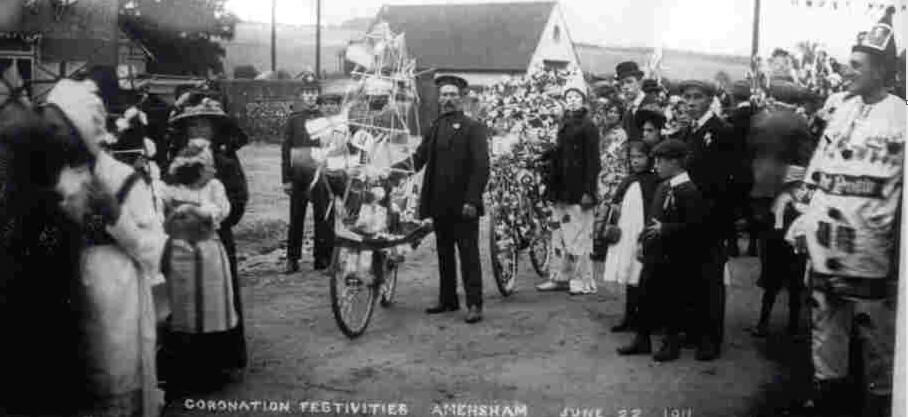GEORGE V Coronation
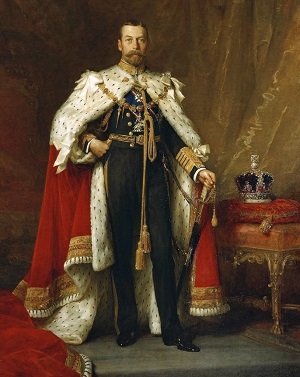
George V was 45 when he ascended the throne in May 1910. He had become heir to the throne following the death of his elder brother in 1892; his father made him Prince of Wales in 1901 and involved him in matters of state so he was well equipped following the death of his father after a reign of only 9 years. His education was primarily naval and he was well travelled by the time he became king. He married Princess Mary of Teck, former fiancee of his late brother; theirs was a happy marriage, with six children and his lifestyle has been described as more upper middle-class, in contrast to the aristocratic lifestyle of his father. One biographer, Harold Nicolson wrote of him as Prince of Wales “He may be all right as a young midshipman and a wise old king, but when he was Duke of York … he did nothing at all but kill [i.e. shoot] animals and stick in stamps.”
Nevertheless, his 25 year reign encompassed a huge amount of social change across Europe; his was the last coronation to include representatives of European great continental empires. He introduced the balcony appearance at Buckingham Palace to the delight of his subjects after the ceremony. Soon after his accession the Parliament Act saw the House of Lords lose the power to veto parliamentary expenditure; He attended a Durbar in Delhi as Emperor of India, visited the troops extensively after World War 1 broke out and distanced his family from their German antecedents by introducing the family name of the House of Windsor in 1917. His reign weathered the “Irish Question” with the creation of the Irish Free State. He appointed the first Labour Prime Minister and lived through the General Strike, remarking to the Prime Minister Baldwin that he should “Try living on their wages before you judge them”. He encouraged the idea of a national Government in 1931, demonstrated that not all socialists were republican and was persuaded to make the first ever Christmas broadcast to the nation in 1932. He valued the Empire and the Statute of Westminster of 1931 confirmed the independence of the various Dominions and the establishment of the idea of Commonwealth. He invariably wielded his influence as a force of neutrality and moderation, seeing his role as mediator rather than final decision maker
He became very popular as a monarch. His grand-daughter, subsequently Queen Elizabeth 11 simply called him “Grandpa England”
CORONATION ARRANGEMENTS 1911
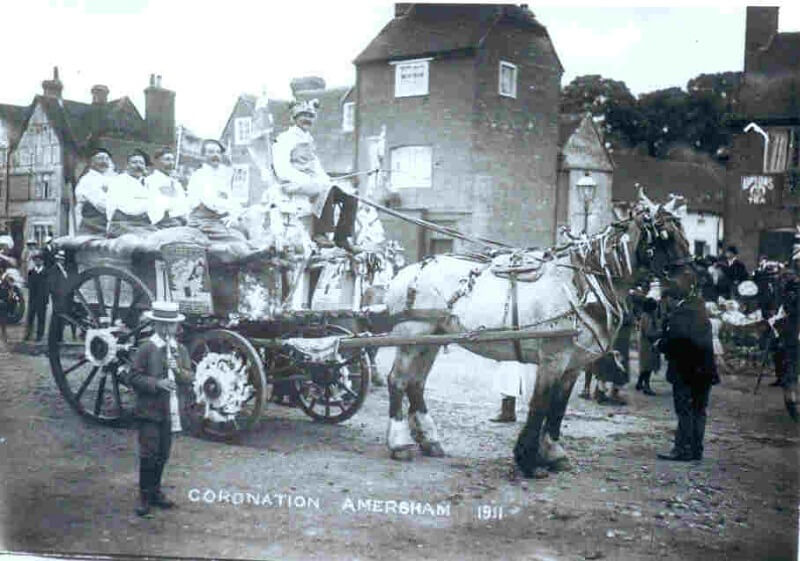
Pupils at St Mary’s school were given a week’s holiday on 19 June, the Coronation being held on 22 June.
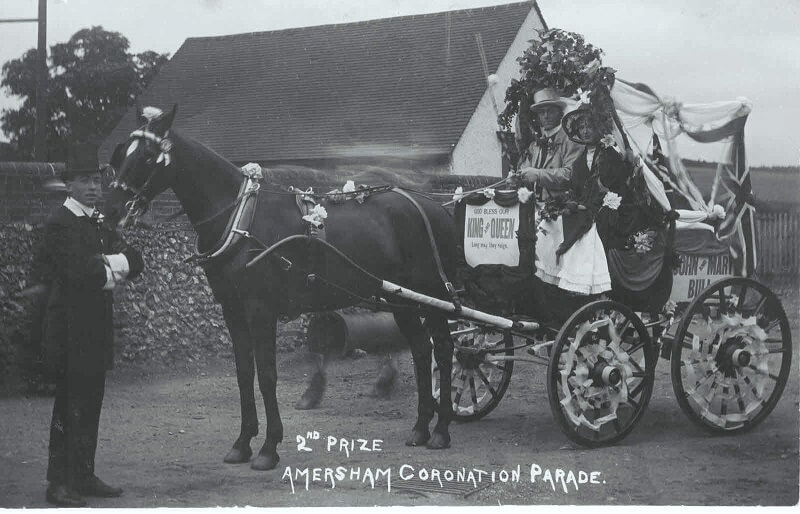
On this occasion, coronation arrangements were swiftly arranged and festivities were greatly enhanced by the active presence of the Amersham Band. Fancy Dress proved to be an extremely popular way of celebrating as the pictures above show; much imagination was used as the photograph below shows and where there was no dray horse to be decorated, a bicycle would do instead!
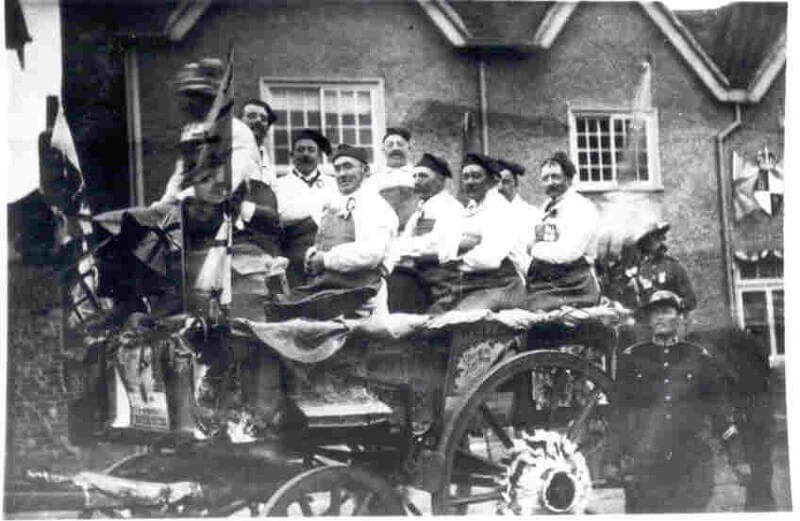
On 17th June 1911 the Bucks Herald reported the arrangements as follows;
12 noon Service at the Parish Church
1.30pm Assembly in the Broadway and singing of the National Anthem accompanied by the Amersham Brass Band
2.00pm Childrens’ Sports
3.00pm Baby Show
4.00pm Daylight Fireworks
4.30pm Tea for Children
6.00-6.30pm Interval for assembly in the Broadway for Fancy Dress recession, for which prizes are offered by the committee
7.00pm Judging and distribution of prizes, mugs, medals etc in Rectory Meadow
7.30-9.00pm Dancing
9.30pm Torchlight Procession
10.00pm Bonfire
10.30pm National Anthem
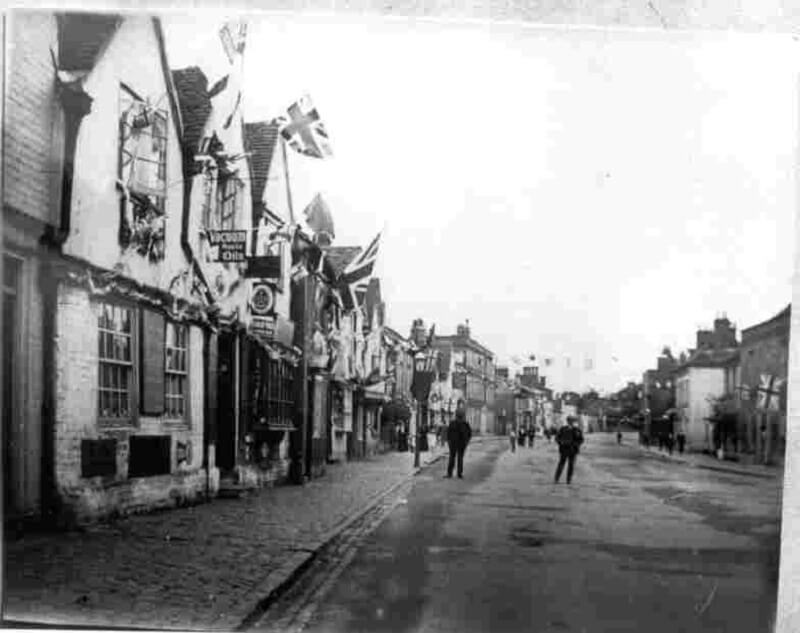
The committee invite their townspeople to decorate and illuminate their houses for the occasion.
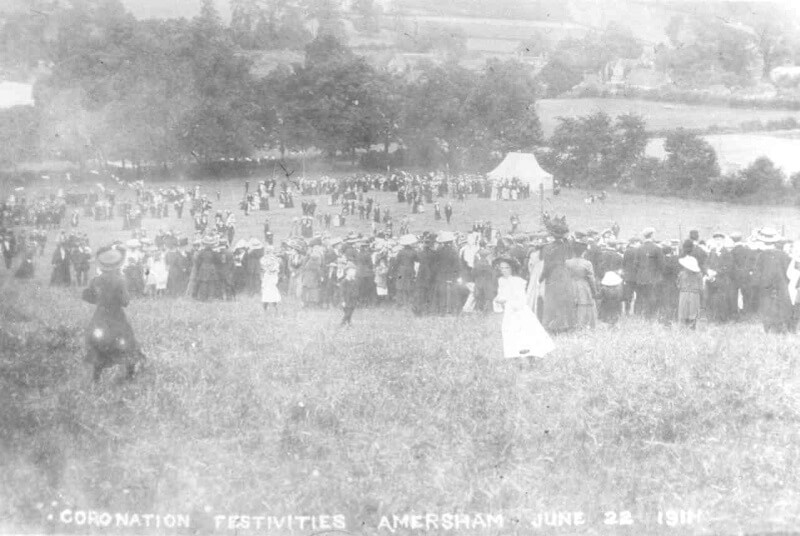
The Amersham Band was in good form and on 24th June 1911 the Bucks Herald reported: Encouraged by the reception accorded to it during the past few months when visiting the surrounding villages and towns, the band has rapidly improved its position by continuous practice. For the last week or two nightly practices have been almost general, and the result is that the two performances of sacred music at Shardeloes on Sunday last, during the afternoon and evening afforded delight to the large numbers of residents and visitors.”
Clearly the results of this enhanced practice paid dividends because a week later, the same newspaper reported:
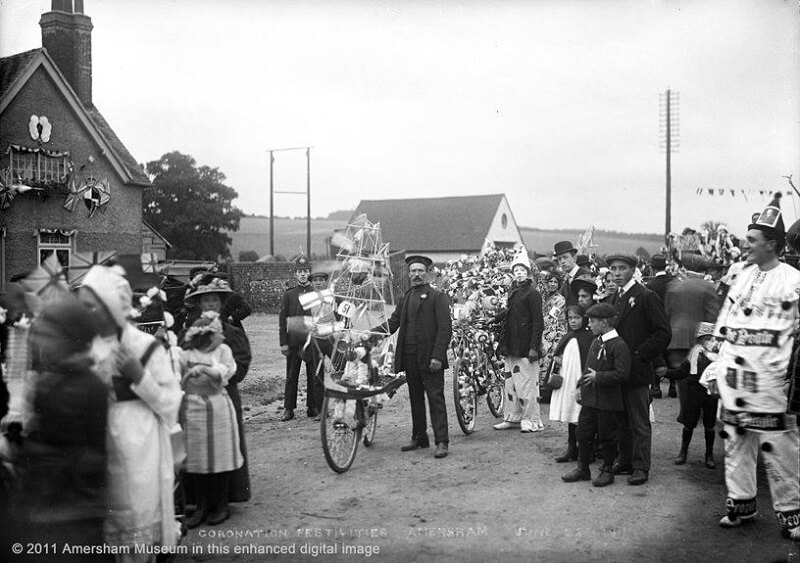
MAGNIFICENT
This was the unanimous verdict at the close of the Coronation festivities here on Thursday. Never before had the town responded so enthusiastically to the call for support to celebrate a great event, and the day will long be remembered. Work for the decoration of the town was commenced on Wednesday, and early on Thursday morning the final touches were given. The town presented an animated appearance throughout. The settings of flags across the streets were numerous, while almost without exception the residents displayed the Royal initials or other fitting device, Fairy lamps were countless, a specially attractive piece of work was made up of the decoration of Dr Henderson’s house, Mr E T Kings shop etc and the Conservative Club building in a combined scheme of coloured lamps which harmonised throughout with much effect. Dr J C Gardner also had a large display of coloured lamps at the Missenden entrance to the town, which was greatly admired. In addition to those competing in the cottage decoration competition, the following were among those having special displays:- Messrs G M H Weller, H S McDonald, J E Mead, J Whiteside, H C Ford, F Read, H Rance, W Bright Dr G S Wynne, Messrs H M Blockley, A B Crowhurst R H Rushforth, J Sealey, G Dobson, E Matthews, F J Fuller, G Ward, and G H Brazil.
Sources
British Newspaper Archive
Wikipedia
The Shortest History of the Crown Stephen Bates
Images
Amersham Museum
Bucks Archive
Martin Pounce. St Mary’s School
Amersham Band

